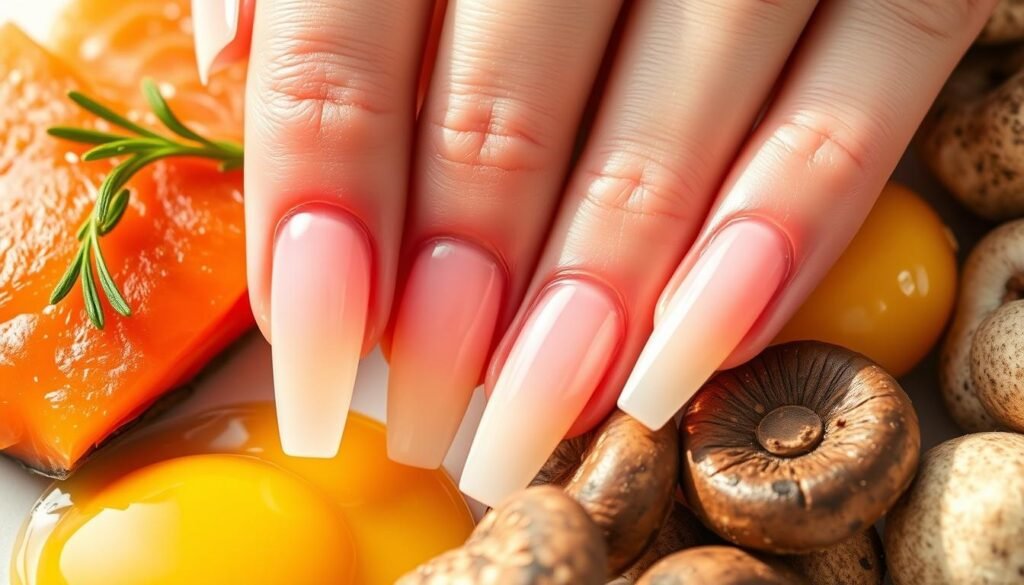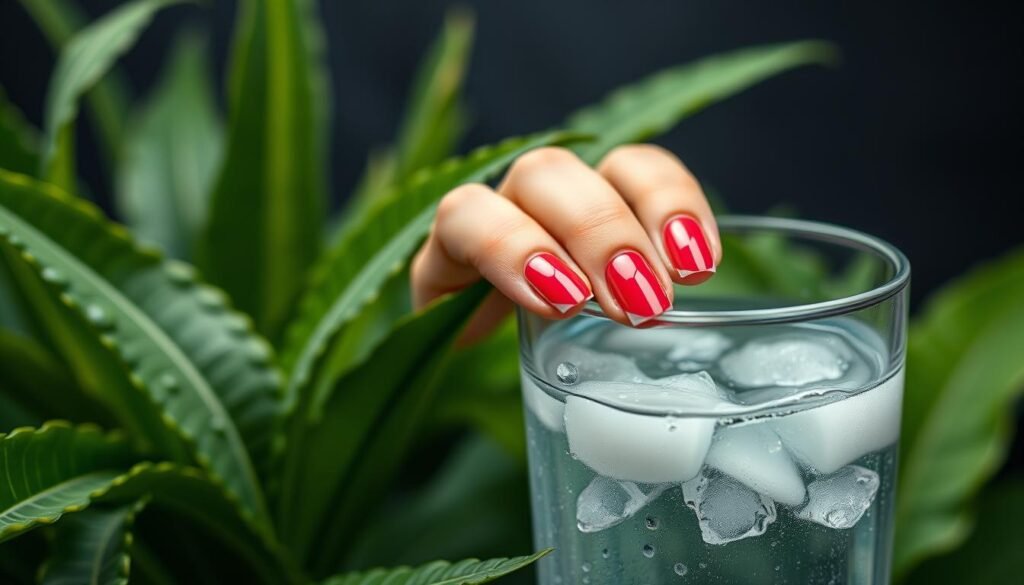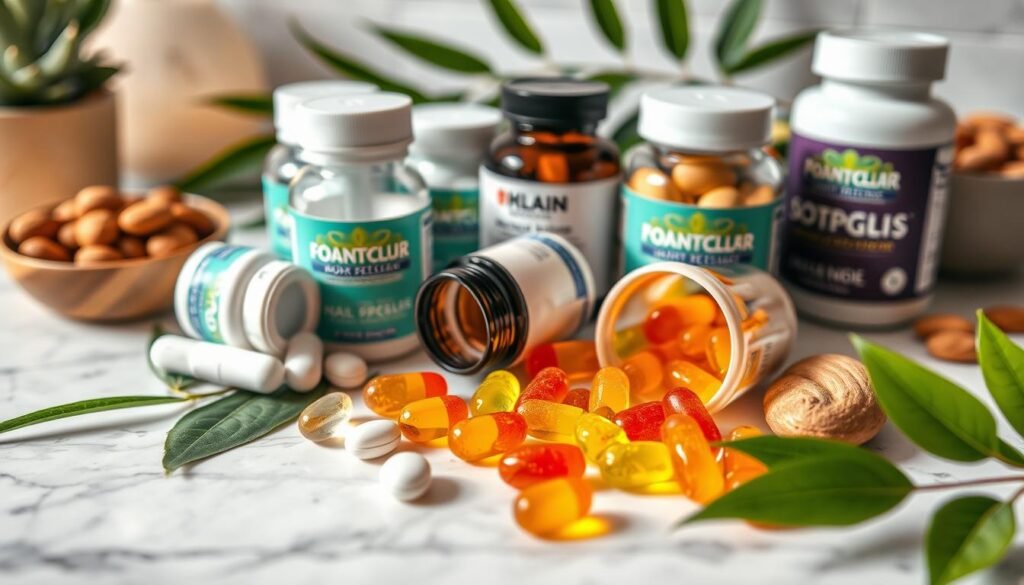Did you know nearly 60% of people in the U.S. don’t eat enough magnesium? This nutrient is key for healthy nails. A lot of us don’t connect what we eat with how our nails look. But, eating well can mean stronger, healthier nails. This article will show why vitamin D and other nutrients are important for your nails. We’ll look at foods that help strengthen your nails and how nutrition affects them. Good nutrition is the first step towards stronger nails.
Key Takeaways
- Diet plays a significant role in nail health and strength.
- Vitamin D is vital for promoting nail growth and preventing brittleness.
- Adults need specific daily requirements of nutrients like iron and magnesium for optimal nail health.
- 2.5 mg of biotin per day can significantly improve brittle nails.
- Incorporating omega-3 fatty acids into your diet can aid in nail strength.
- Legumes, eggs, and fatty fish are outstanding food sources for maintaining healthy nails.
The Importance of Vitamin D for Nail Health
Vitamin D is crucial for keeping our nails strong. It helps control the calcium in our bodies. This is very important for nails to be strong and not break easily. Without enough vitamin D, our nails can get weak and break.
Studies show that having enough vitamin D can make our nails stronger and help them grow. It not only helps our nails but also our bones and skin. Vitamin D3, in particular, can protect our skin and make it look healthy.
Zinc and calcium also play a big part in having healthy nails. Zinc helps our skin and nails stay healthy. Calcium is important for the base of our nails. Together with vitamin D, these nutrients make our nails strong.
Using products like Camel Milk Hand Cream can help a lot. It has many vitamins and minerals for strong nails. So, vitamin D and these nutrients are key for beautiful nails and overall health.
Identifying Nail Health Issues
Nails can show a lot about your overall health. For example, having brittle nails might mean you’re not getting enough essential nutrients like iron. This could be due to too much water contact or harsh chemicals. Knowing what signs to look for is key to keeping nails healthy.
If your nails are soft or weak, you might not be getting enough B vitamins, calcium, or fatty acids. Slow nail growth or peeling indicates there might be harmful things in your environment. It’s important to notice these changes.
Seeing vertical or horizontal ridges on your nails might tell your age or suggest health problems, like kidney disease. Yellow nails could mean you have an infection or are reacting badly to some products. They might also indicate serious conditions like diabetes or thyroid issues. Recognizing these signs early can help catch nail health issues.
Changes in nail color and texture might show more severe health problems. Black lines, known as splinter hemorrhages, could come from injuring your nail or from diseases like psoriasis. Watching your nails closely and acting to prevent problems can make them healthier.
Foods Rich in Vitamin D
Eating a variety of foods rich in vitamin D is key for healthy nails. These foods give you the nutrients you need and help keep your nails from common problems. The top foods for this are eggs, fatty fish, and fortified dairy items.
Eggs: The Powerhouse of Nutrition
Eggs are a great choice for getting more vitamin D and biotin. These nutrients are important for strong and healthy nails. Eggs also have iron, which helps nails grow.
Fatty Fish: A Rich Source
Fatty fish are high in omega-3 fatty acids and vitamin D. Eating salmon, mackerel, or sardines can make your nails stronger and more moist. These fish improve nail texture and boost your overall health.
Fortified Foods: Getting Your D from Dairy
Fortified dairy products are a good way to get more vitamin D. You can drink fortified milk or eat yogurt to help keep your nails strong. These foods are easy to add to your meals and improve your health.
Vitamin D and Strengthen Your Nails
Vitamin D is key for healthy nails. It helps your body make keratin, the protein that creates nails. Lack of vitamin D can cause nails to peel and become brittle. Many with low vitamin D have nails that peel and ridge, affecting their look and health.
Adding vitamin D-rich foods or supplements can improve nail growth support. It works with calcium to make nails hard and grow right. With enough vitamins and minerals, nails can withstand more and break less.
Some studies show that using vitamin D supplements for two months can make nails stronger. Keeping vitamin D levels up is crucial, not just for nails but for overall health too.
To better nail health, eat foods high in vitamin D. Fatty fish and fortified dairy are good choices. Camel milk is also great for nail growth support. It has nutrients that keep nails strong.

Other Essential Nutrients for Nail Growth
Strong and healthy nails need more than just vitamin D. They require a mix of vitamins and minerals. These nutrients transform nails from weak to strong and beautiful.
Biotin: The Nail Strengthener
Biotin, or Vitamin H, is key for nail growth. Taking 2.5 mg of biotin daily can make nails thicker and stronger. It fights brittleness. Biotin is in eggs, nuts, and seeds, helping nails to be healthier.
Protein: Building Stronger Nails
Protein is crucial for nails. It’s the main part of keratin, which nails are made of. Enough protein keeps nails strong and less likely to break. Eat lean meats, dairy, and legumes for good nail health.
Iron: Vital for Oxygen Supply
Iron is vital for healthy nails, as it delivers oxygen to nail cells. Low iron can cause nail problems, like ridges. Eat foods rich in iron, such as spinach, legumes, and red meat, to keep nails healthy.
Impact of Hydration on Nail Health
Hydration is key to keeping nails in good shape. Not drinking enough water can lead to dry nails. These may look brittle and break easily. Without enough moisture, nails can become less flexible and more likely to get damaged.
Drinking enough water is crucial for strong, healthy nails. It helps get important nutrients and oxygen to the nails. Adding fruits and vegetables to your diet also boosts hydration. This makes nails healthier overall.
Using lotion often can help fight off nail dryness and make them stronger. Keeping track of how much water you drink daily helps keep nails less prone to breaking.

The following table shows how different hydration methods affect nail health:
| Hydration Practice | Effect on Nails |
|---|---|
| Drinking plenty of water daily | Improves overall nail flexibility and reduces brittleness |
| Incorporating water-rich foods | Enhances nutrient delivery and supports healthy nail growth |
| Using moisturizing lotion regularly | Prevents drying out, reducing the risk of breakage |
| Avoiding excessive nail polish use | Allows nails to breathe, maintaining strength and health |
| Consuming a balanced diet | Provides essential vitamins and minerals vital for nail strength |
Focusing on hydration can greatly improve nail health. It helps avoid problems that come with dry nails. This ensures nails stay strong and look beautiful.
Nail Care Routine: Incorporating Nutrition
A good nail care routine isn’t just about how you groom your nails. It’s also key to focus on nutrition for nails. Eating well, with lots of vitamins and minerals, helps your nails grow strong and healthy.
Here’s what you need for a top-notch nail care routine:
- Drink plenty of water to keep your nails hydrated.
- Eat foods rich in biotin to boost keratin production. This means tougher nails.
- Use vitamin E for its protection against damage.
- Add vitamin C to your diet to make your nails more resilient.
- Don’t forget calcium and vitamin D for strong nails.
Adding these nutrients can make a big difference in how your nails look and feel. For instance, taking 2.5 mg of biotin each day can make your nails thicker. This means they won’t split or break easily. Experts agree that combining good nutrition for nails with proper nail care is the best way to improve nail health.
Supplements vs. Whole Foods
Discussing healthy nails leads to the whole foods versus supplements debate. Supplements like Biotin boost nail and hair health quickly. Yet, foods often contain Biotin, making its deficiency rare.
Foods offer nutrients that supplements alone can’t match. Selenium-rich foods, such as fish and whole grains, strengthen nails. Collagen, vital for nails, lessens with age. Foods like fish, lean meats, and dairy support collagen and nail strength. It’s clear natural foods often outdo supplements in nutrition.
Low iron levels can lead to brittle nails. Iron-packed foods like spinach and cereals are important. Zinc also plays a key role in healthy nails. Shellfish and nuts, rich in zinc, show whole foods provide complete nutrition.
While supplements focus on single nutrients, whole foods offer broader benefits. A diet filled with veggies, fruits, and lean proteins is key for nail growth. Always check supplement labels for quality and proper dosage.
Combining supplements and whole foods can effectively maintain nail health. Nails grow about 3mm monthly, needing consistent nutrient supply for peak condition.

Common Nail Issues Linked to Nutritional Deficiencies
Nails can reveal a lot about your health. Problems like brittle or discolored nails often trace back to what you eat. For example, not getting enough Vitamin B12 can cause several nail issues. This includes nails that split, suggesting you need more protein.
Other nail issues involve:
- White spots on nails often mean you lack iron or zinc.
- Discoloration usually points to a fungal infection, not missing nutrients.
- Brittle nails could be due to harsh chemicals or not enough iron.
- Pitting of nails might show a need for more Vitamin D.
- Grooves on nails suggest you might need more Vitamin B12.
- Spoon nails, with a dip in the center, often lack Vitamin C.
- Ridges in the middle of nails could indicate a need for B Vitamins, especially folic acid, or more proteins and iron.
Low biotin levels can also make nails weaker and more likely to break. Taking more Vitamin B12 can really help your nails. Plus, Vitamin C is key for making collagen. This keeps nails strong. Eating a diet with these vitamins is vital to solve nail issues.
Fixing these nail problems can lead to healthier nails and better health overall. Making diet changes to get important vitamins can improve your nails a lot. For advice on fixing these shortages, visit nutritional deficiencies effects on nails.
Conclusion
To keep your nails strong and pretty, you need a good plan. This plan should include getting enough nutrients, especially vitamin D. A diet with plenty of vitamin D helps not just your overall health but your nails too. Your nails become stronger and less likely to snap.
What you eat affects your nails a lot. If you don’t get the right nutrients, your nails might get weak, change color, or grow weirdly. By knowing how your diet links to your nail health, you can pick better foods for your nails. Foods rich in biotin, protein, and vitamins are key for healthy nails.
Healthy nails come from focusing on nutrition, drinking enough water, and taking care of your nails. This approach will make your nails better. It will also make you feel more confident about how you look after yourself. If you keep at it, you’ll see how crucial vitamin D is for your nails. And, you’ll enjoy better health and more beauty.



